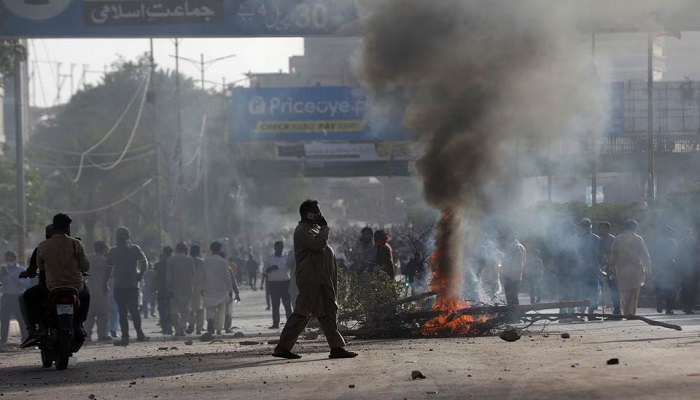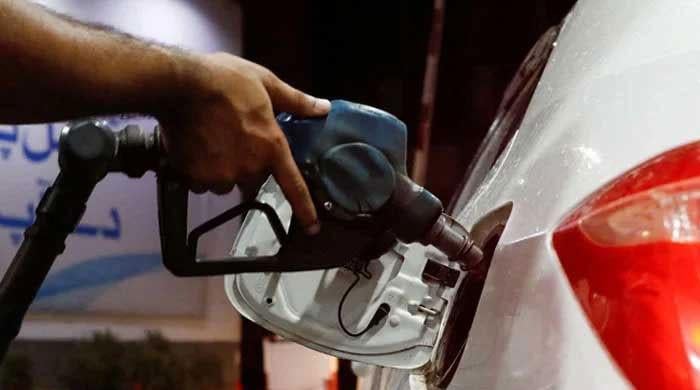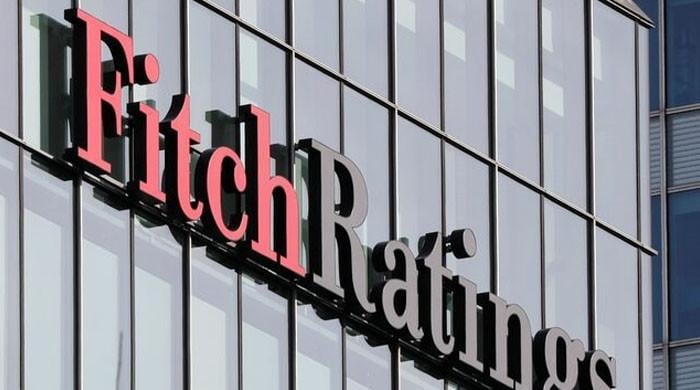Imran Khan's arrest may prove 'straw that breaks camel's back' for economy
Industrial activity crashed after central bank raised interest rates to a record 21% to battle inflation, worsening already-high unemployment and poverty
May 09, 2023

Pakistan Tehreek-e-Insaf's (PTI) call for shutting down the country to protest what it called an 'illegal' arrest of its chairman Imran Khan may prove the straw that breaks the camel's back for Pakistan's already crippled economy if the crisis on hand is not averted politically, analysts said on Tuesday.
The South Asian nation of 220 million people is running out of dollars, inflation is running at over 36% and an expected International Monetary Fund (IMF) bailout has been delayed by months.
National Accountability Bureau (NAB) arrested the former prime minister at Islamabad High Court. Footage of the arrest showed dozens of paramilitary troops in riot-control gear surrounding Khan and leading him into a black pickup truck by his arm.
Khan's arrest comes a day after the military's media wing issued a rare public rebuke of the former premier for repeated accusations against a senior military official of attempting to assassinate him and the military's former chief of being behind the move to remove him from power.
Tensions ran high in major cities following the arrest.
Economic slowdown
Industrial activity has virtually ground to a halt as the central bank has raised interest rates to a record 21% to battle inflation, worsening already-high unemployment and poverty.
Women and children have been killed in stampedes at food distribution centres as food inflation rises to an all-time high of 40%.
Stalled bailout
An IMF bailout programme, which expires in June, has been stalled since November. Foreign exchange reserves at $4.457 billion cover barely a month's worth of imports.
Debt relief from friendly countries such as China, Saudi Arabia and the United Arab Emirates has yet to materialise fully.
Revenue shortfall
A revenue shortfall for the fiscal year through June is projected to overshoot targets substantially by most estimates, while the rupee remains weak.
Elections
Pakistan is in a constitutional standoff after Prime Minister Shehbaz Sharif's government in April rejected a Supreme Court order to hold local elections in Punjab province by the middle of May. Non-compliance could result in court action against the government. The court has previously sacked two prime ministers.
Political pressures
Khan, arrested for alleged corruption and ousted as prime minister last year, had been ratcheting up pressure on the government through a sustained political campaign as he vied to return to power.
Authorities had made several attempts to arrest Khan since March, which had resulted in clashes between his supporters and law enforcement personnel.
Rising militancy
The government says it plans a nationwide operation to root out militants in the face of recent attacks. The last such operation, in 2014, cost the country billions of dollars, killed hundreds and resulted in the displacement of about a million people.
Hundreds of supporters blocked streets in Khan's home town of Lahore, where police have been put on high alert, as well as the northwestern province of Khyber Pakhtunkhwa. Protesters also blocked a major road in the port city of Karachi.
Shut down Pakistan
Khan will be brought before an anti-graft court on Wednesday. In response, PTI called on supporters to "shut down Pakistan".
"It’s your time, people of Pakistan. Khan has always stood for you, now its time to stand for him," the PTI wrote on Twitter.
Khan, 70, a cricket hero-turned-politician, has shown no sign of slowing down since he was ousted as prime minister in April last year, even after being wounded in a November attack on his convoy as he lead a protest march to Islamabad calling for snap general elections.
Land Fraud
Interior Minister Rana Sanaullah told reporters that Khan had been arrested by the NAB after he did not appear "despite notices".
He said the charges against Khan were that he and his wife had received land worth up to seven billion rupees ($24.70 million) from a land developer that had been charged with money laundering by British authorities.
He added that British authorities had returned 190 million pounds ($240 million) to Pakistan in connection with money laundering, which Khan then returned to the land developer instead of keeping it in the national exchequer.
Khan had denied wrongdoing.
The NAB issued Khan's arrest warrant on May 1, according to an order seen by Reuters. "Khan is accused of commission of the offence of corruption and corrupt practices," it said.
The graft case is one of more than 100 registered against Khan since he was ousted from power in a parliamentary vote. He served four of his five-year term.
In most of the cases, Khan faces being barred from holding public office if convicted, with a national election scheduled for November.
Political infighting is common in Pakistan, where no prime minister has yet fulfilled a full term and where the military has ruled for nearly half of the country's history.












